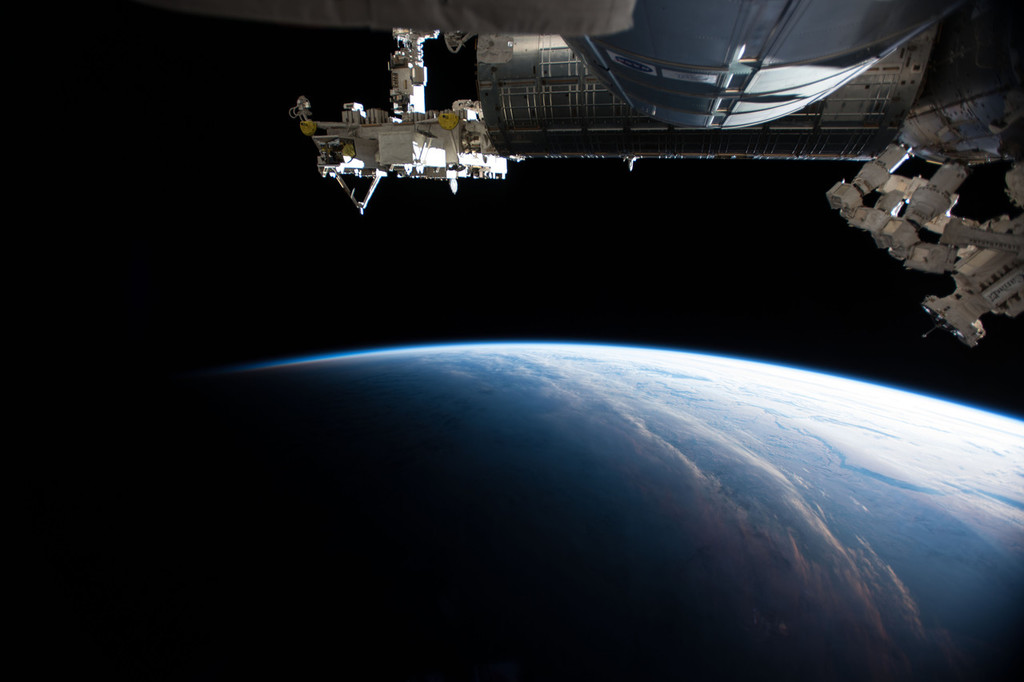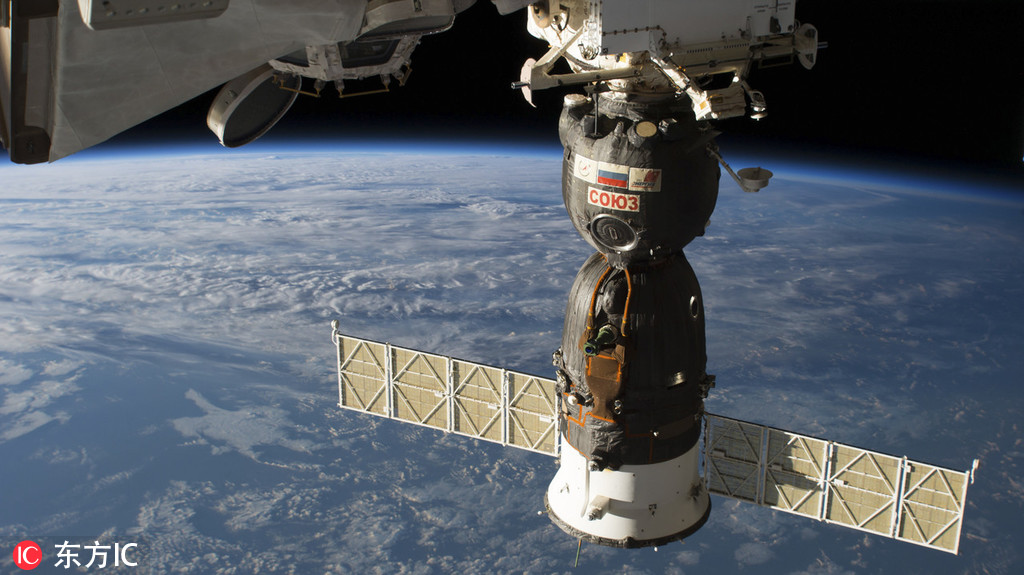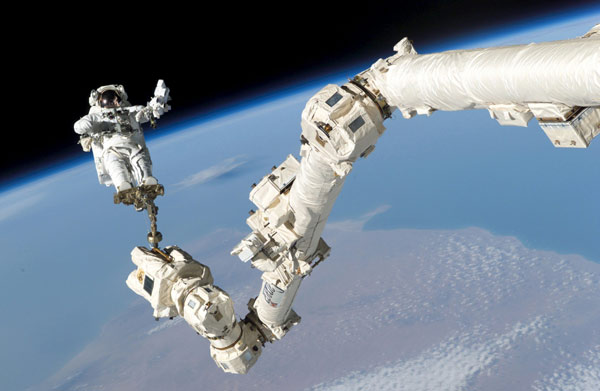3D打印機造出太空人造肉 或可供宇航員食用 'One small nibble for man': 3D printer makes meat in space
中國日報網(wǎng) 2019-10-12 08:54

在宇宙飛船大口吃肉,享用完還可以自己3D打印一份留到下頓,這聽著像不像科幻小說的情節(jié)?最近,科學家研制出的3D生物打印機就把這一夢想變?yōu)楝F(xiàn)實。

Sunrise over the surface of the earth as seen from the International Space Station, Feb 9, 2018. [Photo/IC]
The prospect of astronauts tucking into a roast dinner has grown slightly closer after a successful experiment used a 3D printer to create meat on the International Space Station.
一項使用3D打印機在國際空間站制作肉類的實驗成功后,宇航員大吃烤肉的夢想距離實現(xiàn)更近了一步。
The bioprinter produced beef, rabbit and fish tissue using magnetic fields in microgravity, a Russian medical technology company involved in the experiment said Wednesday.
10月9日,參與實驗的一家俄羅斯醫(yī)療技術(shù)公司表示,這款生物打印機利用微重力環(huán)境下的磁場制造出了牛肉、兔子肉和魚肉組織。
microgravity[,ma?kro'ɡr?v?ti]:n. 微重力
The experiment -- an international collaboration involving US, Russian and Israeli companies -- was carried out in September by cosmonaut Oleg Skripochka in the station's Russian segment using a 3D printer developed in Moscow.
今年9月,宇航員奧列格·斯克里波奇卡在國際空間站俄羅斯艙段使用莫斯科研發(fā)的3D打印機開展了這一實驗。該實驗由美國、俄羅斯和以色列公司合作完成。
The creators say it is the first to create a small amount of artificial meat in conditions of weightlessness.
研究人員說,這是首次在失重條件下制造出少量人造肉。
"It's one small nibble for man, one giant bite for mankind," said Yusef Khesuani of 3D Bioprinting Solutions, the Russian laboratory that created the bioprinter.
俄羅斯3D生物打印解決方案實驗室的尤塞夫·赫蘇亞尼說:“這是個人的一小口,人類的一大口。”該實驗室正式完成這一試驗的生物打印機制造商。
nibble [?n?bl]:n.輕咬;啃;細咬

Photo taken on Sep 14, 2018 is the Soyuz MS-09 spacecraft docked at the International Space Station. [Photo/IC]
The laboratory was founded by Invitro, a large Russian private medicine company.
該實驗室是由俄羅斯大型私營醫(yī)藥公司Invitro成立的。
The Roscosmos space agency part-financed the experiment as of national importance.
俄羅斯聯(lián)邦航天局也為這項具有國家級重要性的試驗資助了部分資金。
"It was really a breakthrough both for Roscosmos and Russia as a whole," said Nikolai Burdeiny, executive director of the state space corporation, which includes Roscosmos.
俄羅斯聯(lián)邦航天局所屬的俄羅斯國家航天公司的執(zhí)行董事尼古拉·布爾杰伊尼說:“這對俄羅斯聯(lián)邦航天局和整個俄羅斯來說都是巨大的突破。”
"For us it was the first experience of international scientific collaboration in space," Khesuani said, using cells provided by Israeli and US food-tech companies.
赫蘇亞尼說:“對我們來說,這是首次在太空開展國際科學合作。”實驗用的是以色列和美國食品科技公司提供的細胞。
"Thank God the experiment went successfully... All the cells showed a good result in space," he added.
他還說:“謝天謝地,試驗成功了……所有細胞在太空的試驗結(jié)果都很好。”

Astronaut Stephen K. Robinson, STS-114 mission specialist, anchored to a foot restraint on the International Space Station's Canadarm2, participates in the mission's third session of extravehicular activity (EVA) August 3, 2005. FLICKR/ SCOTT KELLY / NASA
Astronauts eat meat on board that is vacuum-packed or dried on Earth but this technology could ultimately be necessary for long voyages into deep space, said veteran cosmonaut Oleg Kononenko.
資深宇航員奧列格·科諾年科說,宇航員在太空通常吃的是地球上真空包裝或脫水的肉類,但這一技術(shù)最終可能成為去外層空間遠航所必需的技術(shù)。
"If we're going to fly further from Earth to other planets in the solar system, we can't take that volume of food with us," he told AFP.
他告訴法新社說:“如果我們要從地球飛到太陽系中的其他行星,我們不能帶那么多食物。”
"In any case we will have to grow and produce food onboard the spaceship."
“無論如何,我們都必須在飛船上種植和生產(chǎn)食物。”
"I think progress is developing very quickly, science and knowledge, and I think this will be within our lifetimes," he said.
他說:“我認為科學和知識進展飛快,在有生之年我們能實現(xiàn)這些目標。”
Creating larger amounts of meat in the Russian segment will need more complex equipment than the current printer, said Khesuani.
赫蘇亞尼說,在國際空間站俄羅斯艙段生產(chǎn)更多肉類需要的設(shè)備比這臺打印機更復雜。
"Then we can create not just small objects but big ones, made of a large mass of cells."
“隨后我們不僅可以制造小塊的肉,甚至可以制造出由大量細胞構(gòu)成的大塊肉。”
"I hope we will continue these experiments."
“我希望這些試驗可以繼續(xù)進行下去。”
英文來源:法新社
翻譯&編輯:yaning

















 英語點津微信
英語點津微信 雙語小程序
雙語小程序